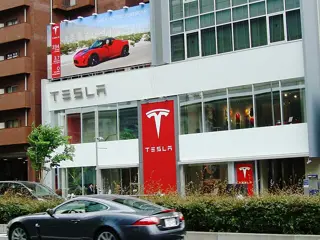Tesla’s Influence on Indian Real Estate: Residential and Commercial Changes

Tesla’s upcoming full-scale entry into India’s automotive market is set to impact the real estate sector. Whether through luxury showrooms or EV-focused residential developments, the electric vehicle giant’s presence could change how spaces are designed, rented, and sold. Let’s explore the potential impacts.
Residential Real Estate: EV-Friendly Homes Become Popular
High-End Properties and EV Infrastructure: Developers might focus on homes near Tesla Supercharger stations or with EV charging ports. Buyers could want garages with high-power outlets, changing property valuations based on proximity to charging stations.
Cost Savings Leading to Upgrades: As Tesla’s affordable models hit the market, homebuyers might spend more on premium features like solar panels or smart home systems, boosting demand for high-value residential projects.
Builder Adjustments: Builders could add battery storage depots or team up with Tesla for integrated energy solutions, enhancing market positioning for eco-friendly communities.
Commercial Real Estate: The Showroom Competition Heats Up
Exclusivity Clauses Changing Leases: As seen in Mumbai’s Bandra-Kurla Complex, Tesla’s use of exclusivity clauses in commercial leases (e.g., blocking competitors like Apple) sets a precedent. Landlords may ask for higher rents from tenants seeking prime retail spaces, leveraging anchor tenants’ prestige.
Growth of EV-Friendly Malls: Shopping centers could attract EV brands with tailored spaces, creating hubs that blend retail and experiential EV showcases, similar to Tesla’s “lifestyle mall” approach.
Grade-A Office Spaces for Auxiliaries: Tesla’s manufacturing plans might increase demand for Grade-A office leases in tech or industrial hubs. Colocation with R&D facilities could boost commercial real estate traction in specialized areas.
Overall Market Trends: A Move Towards Sustainability
- Pricing Pressures: Residential developers offering EV-ready amenities may see price premiums, while commercial landlords combat exclusivity clauses by mixing tenant types.
- Policy Alignments: India’s EV push (e.g., 2030 electrification goals) could speed up infrastructure investments, making real estate projects with green credentials more appealing.
- Regional Differences: Tier-1 cities may feel Tesla’s retail impact first, while Tier-2 markets lag—creating uneven growth opportunities.
Tesla’s disruption is unlikely to replace existing players but will act as a catalyst. Real estate stakeholders must adapt quickly to take advantage of this EV-driven paradigm shift.